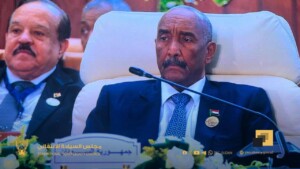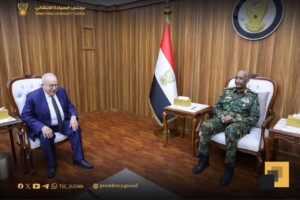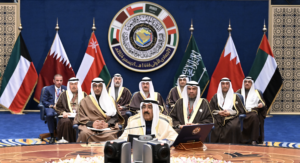Sudan, Darfur rebels fail to agree on peace talk agenda
The Sudanese government and the rebel groups in the peace negotiations in Addis Ababa have failed to strike an agreement on the Darfur conflict and establish an agenda since the start on Monday. Ahmed Tugud Lisan, chief negotiator on behalf of the JEM and the SLM-MM on Thursday told Radio Dabanga that the two sides have created a “vast gap” on reaching an agreement on the agenda points during the African Union-brokered peace process. “The government delegation stuck to its previous position by saying that the policial issues, the issue of the internally displaced, reconciliations, and other issues have been addressed in the Doha Document for Peace in Darfur (DDPD),” Lisan said. In response, Dr Amin Hassan Omar, the head of the government delegation, pointed for these issues to the Doha agreement, signed in 2011. “The Addis Ababa negotiations are concerned only with a ceasefire and security arrangements.” Since Monday, the Sudanese government delegation and representatives of two rebel groups, the Justice and Equality Movement and the Minni Minawi faction of the Sudan Liberation Movement, are engaged in talks on a cessation of hostilities and security arrangements in Darfur. Both sides, on Thursday, held preliminary a consultation meeting with the mediators. The two sides discussed a draft proposal presented by the AU chief mediator but failed to bridge differences. With regard to the draft proposal, the rebel chief negotiator said his team partially accepts it, but expressed discontent. “The draft proposal is missing important issues which need to be discussed,” Lisan said. Rebels demands Following the meeting, the rebel groups issued a joint statement saying that the “proposed agenda overlooked many of the core issues” and therefore suggested to add “1) land, land, hawakeer, borders and nomad issues, 2) compensation, 3) refugees and displaced people, and 4) reconstruction and development issues”. The government delegation rejected the inclusion of the mentioned points in the agenda. Representative Mohamed Mohamed Kheir told Sudan Tribune that Khartoum’s negotiating team was not entitled to engage on other issues other than a cessation of hostilities in accordance to the Doha peace agreement. However, he said that his delegation has no objection to discuss the humanitarian situation within the security arrangements. “I don’t think an agreement will be reached” he said adding “the mediation is most likely to suspend the talks for a while and we take the agenda back to Khartoum,” Kheir said. The rebels want the talks in Addis Ababa to be comprehensive but the government delegation has insisted the negotiations must be an extension of the DDPD. File photo: The opening session of the peace talks, brokered by the African Union High-level Implementation Panel (AUHIP), in Addis Ababa, Ethiopia, 23 November 2014 (Hamid Abdelsalam / Unamid) Related: Sudan’s rebels insist on ‘comprehensive solution’ agenda in Addis talks (25 November2014)
The Sudanese government and the rebel groups in the peace negotiations in Addis Ababa have failed to strike an agreement on the Darfur conflict and establish an agenda since the start on Monday.
Ahmed Tugud Lisan, chief negotiator on behalf of the JEM and the SLM-MM on Thursday told Radio Dabanga that the two sides have created a “vast gap” on reaching an agreement on the agenda points during the African Union-brokered peace process.
“The government delegation stuck to its previous position by saying that the policial issues, the issue of the internally displaced, reconciliations, and other issues have been addressed in the Doha Document for Peace in Darfur (DDPD),” Lisan said.
In response, Dr Amin Hassan Omar, the head of the government delegation, pointed for these issues to the Doha agreement, signed in 2011. “The Addis Ababa negotiations are concerned only with a ceasefire and security arrangements.”
Since Monday, the Sudanese government delegation and representatives of two rebel groups, the Justice and Equality Movement and the Minni Minawi faction of the Sudan Liberation Movement, are engaged in talks on a cessation of hostilities and security arrangements in Darfur. Both sides, on Thursday, held preliminary a consultation meeting with the mediators.
The two sides discussed a draft proposal presented by the AU chief mediator but failed to bridge differences. With regard to the draft proposal, the rebel chief negotiator said his team partially accepts it, but expressed discontent. “The draft proposal is missing important issues which need to be discussed,” Lisan said.
Rebels demands
Following the meeting, the rebel groups issued a joint statement saying that the “proposed agenda overlooked many of the core issues” and therefore suggested to add “1) land, land, hawakeer, borders and nomad issues, 2) compensation, 3) refugees and displaced people, and 4) reconstruction and development issues”.
The government delegation rejected the inclusion of the mentioned points in the agenda. Representative Mohamed Mohamed Kheir told Sudan Tribune that Khartoum’s negotiating team was not entitled to engage on other issues other than a cessation of hostilities in accordance to the Doha peace agreement. However, he said that his delegation has no objection to discuss the humanitarian situation within the security arrangements.
“I don’t think an agreement will be reached” he said adding “the mediation is most likely to suspend the talks for a while and we take the agenda back to Khartoum,” Kheir said.
The rebels want the talks in Addis Ababa to be comprehensive but the government delegation has insisted the negotiations must be an extension of the DDPD.
File photo: The opening session of the peace talks, brokered by the African Union High-level Implementation Panel (AUHIP), in Addis Ababa, Ethiopia, 23 November 2014 (Hamid Abdelsalam / Unamid)
Related: Sudan’s rebels insist on ‘comprehensive solution’ agenda in Addis talks (25 November
2014)











 and then
and then